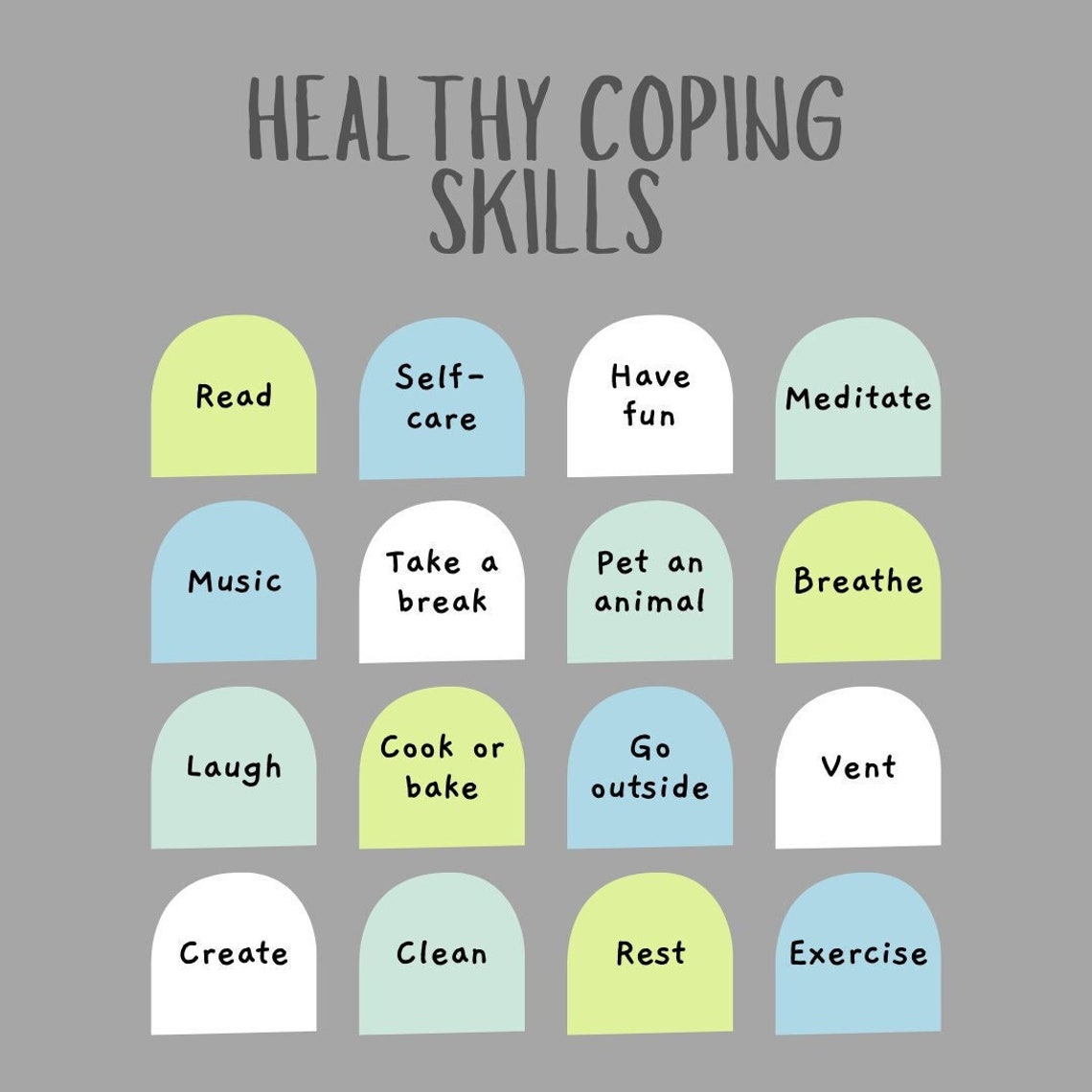“Healthy Coping Mechanisms: Navigating Life’s Challenges with Resilience
Related Articles Healthy Coping Mechanisms: Navigating Life’s Challenges with Resilience
- Revolutionizing Healthcare with AI: Enhancing Diagnostic Accuracy Through Smart Devices
- The Future of Home Blood Glucose Monitoring: Unlocking the Power of AI
- Okay, Here’s A Comprehensive Article On Healthy Lifestyle Tips, Aiming For Around 1600 Words. I’ve Tried To Make It Practical And Actionable.
- The Future of Healthcare: AI-Powered Devices for Real-Time Patient Monitoring
- The Blueprint For A Vibrant Life: A Comprehensive Guide To Healthy Living
Introduction
With great enthusiasm, we delve into Healthy Coping Mechanisms: Navigating Life’s Challenges with Resilience, a subject that holds significance in today’s world. Whether you are new to this topic or looking to deepen your understanding, this article aims to offer valuable insights and spark curiosity.
Table of Content
Healthy Coping Mechanisms: Navigating Life’s Challenges with Resilience

Life is a tapestry woven with moments of joy, love, and triumph, but it also inevitably includes periods of stress, adversity, and loss. How we navigate these challenging times is crucial for our overall well-being. Coping mechanisms are the strategies we use to deal with stress and difficult emotions. While some coping mechanisms can be harmful in the long run, healthy coping mechanisms can promote resilience, emotional stability, and a greater sense of control over our lives.
What are Coping Mechanisms?
At their core, coping mechanisms are the psychological and behavioral strategies individuals employ to manage internal and external stressors. These mechanisms can be conscious or unconscious, adaptive or maladaptive. They serve as a buffer against the negative impacts of stress, helping us to regulate our emotions, problem-solve, and maintain a sense of equilibrium.
The Importance of Healthy Coping
Choosing healthy coping mechanisms is paramount for several reasons:
- Mental and Emotional Well-being: Healthy coping strategies can reduce symptoms of anxiety, depression, and other mental health conditions. They help us process emotions in a constructive way, rather than suppressing or avoiding them.
- Physical Health: Chronic stress can have detrimental effects on the body, including weakened immune function, cardiovascular problems, and digestive issues. Healthy coping mechanisms can mitigate these physical consequences.
- Relationships: When we cope effectively with stress, we are better able to maintain healthy relationships. We are less likely to lash out at loved ones or withdraw from social interactions.
- Resilience: Healthy coping builds resilience, which is the ability to bounce back from adversity. It equips us with the skills and mindset to face future challenges with greater confidence and strength.
- Personal Growth: Successfully navigating stressful situations can lead to personal growth and self-discovery. It can help us develop a deeper understanding of ourselves, our values, and our capabilities.

Unhealthy vs. Healthy Coping Mechanisms
It’s essential to distinguish between unhealthy and healthy coping mechanisms. Unhealthy coping mechanisms may provide temporary relief but ultimately exacerbate problems and lead to negative consequences. Examples of unhealthy coping mechanisms include:
- Substance Abuse: Turning to drugs or alcohol to numb emotions.
- Emotional Eating: Using food as a source of comfort or to suppress feelings.
- Avoidance: Ignoring problems or withdrawing from social interactions.
- Self-Harm: Engaging in behaviors that cause physical harm.
- Aggression: Expressing anger in destructive ways.
- Denial: Refusing to acknowledge the reality of a situation.
- Rumination: Dwelling on negative thoughts and feelings.


Healthy coping mechanisms, on the other hand, address the root of the problem, promote emotional regulation, and contribute to long-term well-being.
Examples of Healthy Coping Mechanisms
Here’s an extensive list of healthy coping mechanisms:
Mindfulness and Meditation:
- Description: Practicing mindfulness involves focusing on the present moment without judgment. Meditation techniques can help calm the mind and reduce stress.
- Benefits: Reduces anxiety, improves focus, promotes relaxation, increases self-awareness.
- How to Implement: Start with short guided meditations (available on apps like Headspace or Calm). Practice mindful breathing or body scan exercises.
Exercise and Physical Activity:
- Description: Engaging in regular physical activity releases endorphins, which have mood-boosting effects.
- Benefits: Reduces stress, improves sleep, boosts energy levels, enhances self-esteem.
- How to Implement: Find an activity you enjoy, such as walking, running, swimming, dancing, or yoga. Aim for at least 30 minutes of moderate-intensity exercise most days of the week.
Spending Time in Nature:
- Description: Exposure to nature has been shown to reduce stress hormones and improve mental well-being.
- Benefits: Calming, restorative, promotes a sense of connection to the natural world.
- How to Implement: Take walks in parks or forests, go hiking, gardening, or simply sit outside and enjoy the scenery.
Creative Expression:
- Description: Engaging in creative activities allows for emotional expression and can be a form of catharsis.
- Benefits: Reduces stress, enhances self-expression, promotes relaxation, boosts creativity.
- How to Implement: Try painting, drawing, writing, playing music, dancing, or crafting.
Journaling:
- Description: Writing down your thoughts and feelings can help you process emotions and gain clarity.
- Benefits: Reduces stress, improves self-awareness, helps identify patterns in thoughts and behaviors.
- How to Implement: Write in a journal regularly, focusing on your thoughts, feelings, and experiences.
Social Connection:
- Description: Spending time with supportive friends and family can provide emotional support and reduce feelings of isolation.
- Benefits: Reduces stress, improves mood, promotes a sense of belonging, provides emotional support.
- How to Implement: Make time for social activities, reach out to friends and family, join a club or group.
Setting Boundaries:
- Description: Establishing clear boundaries in relationships and other areas of life can reduce stress and prevent burnout.
- Benefits: Reduces stress, improves self-esteem, protects your time and energy.
- How to Implement: Learn to say "no" to requests that are overwhelming or draining. Communicate your needs and limits to others.
Practicing Gratitude:
- Description: Focusing on the positive aspects of your life can improve your mood and increase overall happiness.
- Benefits: Reduces stress, improves mood, promotes a sense of well-being.
- How to Implement: Keep a gratitude journal, express appreciation to others, or simply take time each day to reflect on the things you are grateful for.
Healthy Sleep Habits:
- Description: Getting enough sleep is essential for physical and mental health.
- Benefits: Reduces stress, improves mood, boosts energy levels, enhances cognitive function.
- How to Implement: Establish a regular sleep schedule, create a relaxing bedtime routine, and avoid caffeine and alcohol before bed.
Learning New Skills:
- Description: Engaging in new activities and learning new skills can provide a sense of accomplishment and boost self-esteem.
- Benefits: Reduces stress, improves self-esteem, promotes cognitive function, provides a sense of accomplishment.
- How to Implement: Take a class, learn a new language, try a new hobby, or volunteer for a cause you care about.
Problem-Solving:
- Description: Actively addressing problems and finding solutions can reduce stress and increase a sense of control.
- Benefits: Reduces stress, increases a sense of control, promotes problem-solving skills.
- How to Implement: Break down problems into smaller steps, brainstorm solutions, and take action to address the root cause of the stressor.
Helping Others:
- Description: Volunteering or helping others can provide a sense of purpose and improve mood.
- Benefits: Reduces stress, improves mood, promotes a sense of purpose, strengthens social connections.
- How to Implement: Volunteer for a cause you care about, offer help to friends and family, or simply perform random acts of kindness.
Deep Breathing Exercises:
- Description: Practicing deep breathing techniques can calm the nervous system and reduce stress.
- Benefits: Reduces stress, promotes relaxation, improves focus.
- How to Implement: Try diaphragmatic breathing, box breathing, or other relaxation techniques.
Progressive Muscle Relaxation:
- Description: This technique involves tensing and relaxing different muscle groups to reduce physical tension.
- Benefits: Reduces stress, promotes relaxation, improves body awareness.
- How to Implement: Find a guided progressive muscle relaxation exercise online or in a book.
Positive Self-Talk:
- Description: Replacing negative thoughts with positive and encouraging ones can improve mood and self-esteem.
- Benefits: Reduces stress, improves mood, boosts self-esteem.
- How to Implement: Challenge negative thoughts, reframe situations in a positive light, and practice self-compassion.
Seeking Professional Help:
- Description: Consulting with a therapist or counselor can provide support and guidance in developing healthy coping mechanisms.
- Benefits: Reduces stress, improves mental health, promotes self-awareness.
- How to Implement: Reach out to a mental health professional for an evaluation and treatment plan.
Developing a Personalized Coping Plan
The most effective approach is to create a personalized coping plan that includes a variety of strategies tailored to your individual needs and preferences. Here’s how to develop one:
- Identify Your Stressors: Make a list of the things that cause you stress.
- Recognize Your Triggers: Pay attention to the situations, people, or thoughts that trigger your stress response.
- Evaluate Your Current Coping Mechanisms: Are they healthy or unhealthy?
- Choose New Healthy Coping Strategies: Select a few strategies from the list above that resonate with you.
- Practice Regularly: Make time for your coping strategies on a regular basis, even when you’re not feeling stressed.
- Be Patient: It takes time to develop new habits. Don’t get discouraged if you don’t see results immediately.
- Seek Support: Talk to a trusted friend, family member, or therapist for support.
- Adjust as Needed: Your coping plan may need to be adjusted over time as your needs change.
Conclusion
Developing healthy coping mechanisms is an ongoing process that requires self-awareness, commitment, and practice. By choosing healthy coping strategies, you can navigate life’s challenges with greater resilience, improve your mental and physical well-being, and live a more fulfilling life. Remember that it’s okay to seek help when you need it. A therapist or counselor can provide valuable support and guidance in developing healthy coping mechanisms and addressing underlying issues.
